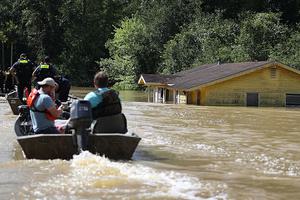Policy
-
A Post-Fact World
How the Attack on Science Is Becoming a Global Contagion
-
Exploring How and Why Trees ‘Talk’ to Each Other
Ecologist Suzanne Simard has shown how trees use a network of soil fungi to communicate their needs and aid neighboring plants. Now she’s warning that threats like clear-cutting and climate change could disrupt these critical networks.
-
Wildlife Farming: Does It Help Or Hurt Threatened Species?
Wildlife farming is being touted as a way to protect endangered species while providing food and boosting incomes in rural areas. But some conservation scientists argue that such practices fail to benefit beleaguered wildlife.
-
Science in the Wild: The Legacy Of the U.S. National Park System
As the National Park Service marks its centennial this month, the parks are being celebrated for their natural beauty and priceless recreational opportunities. But they also provide a less recognized benefit: the parks serve as a living laboratory for critical scientific research.
-
Rocky Flats: A Wildlife Refuge Confronts Its Radioactive Past
The Rocky Flats Plant outside Denver was a key U.S. nuclear facility during the Cold War. Now, following a $7 billion cleanup, the government is preparing to open a wildlife refuge on the site to the public, amid warnings from some scientists that residual plutonium may still pose serious health risks.
-
Video Contest Winner - Runner Up
An Amazon Tribe’s Deadly Fight To Save Its Land From Logging
-
Video Contest Winner - Runner Up
After Denial: How People React to the Hard Reality of Climate Change
-
Video Contest Winner - Runner Up
Chocolate in the Jungle: The Battle To Save a Disappearing Rainforest
-
At Ground Zero for Rising Seas, TV Weatherman Talks Climate
John Morales is part of a new breed of television weather forecasters seeking to educate viewers on climate change and the threat it poses. In South Florida, where sea level rise is already causing periodic flooding, he has a receptive audience.
-
How Growing Sea Plants Can Help Slow Ocean Acidification
Researchers are finding that kelp, eelgrass, and other vegetation can effectively absorb CO2 and reduce acidity in the ocean. Growing these plants in local waters, scientists say, could help mitigate the damaging impacts of acidification on marine life.
-
Unable to Endure Rising Seas, Alaskan Villages Stuck in Limbo
As an advocate for Alaska’s Native communities, Robin Bronen points to a bureaucratic Catch-22 — villages cannot get government support to relocate in the face of climate-induced threats, but they are no longer receiving funds to repair their crumbling infrastructure.
-
For India’s Captive Leopards, A Life Sentence Behind Bars
As sightings of leopards in populated areas increase, Indian authorities are trapping the animals and keeping them in captivity — often in small cages without adequate food or veterinary care. The real solution, wildlife advocates say, is to educate the public on how to coexist with the big cats.
-
What Would a Global Warming Increase of 1.5 Degrees Be Like?
The Paris climate conference set the ambitious goal of finding ways to limit global warming to 1.5 degrees Celsius, rather than the previous threshold of 2 degrees. But what would be the difference between a 1.5 and 2 degree world? And how realistic is such a target?
-
In Iowa, A Bipartisan Push to Become Leader in Wind Energy
Thanks to state officials who have long supported renewables, Iowa now leads all U.S. states in the percentage of its energy produced from wind. Big companies, including Facebook and Google, are taking notice and cite clean energy as a major reason for locating new facilities there.
-
Hard-Pressed Rust Belt Cities Go Green to Aid Urban Revival
Gary, Indiana is joining Detroit and other fading U.S. industrial centers in an effort to turn abandoned neighborhoods and factory sites into gardens, parks, and forests. In addition to the environmental benefits, these greening initiatives may help catalyze an economic recovery.








